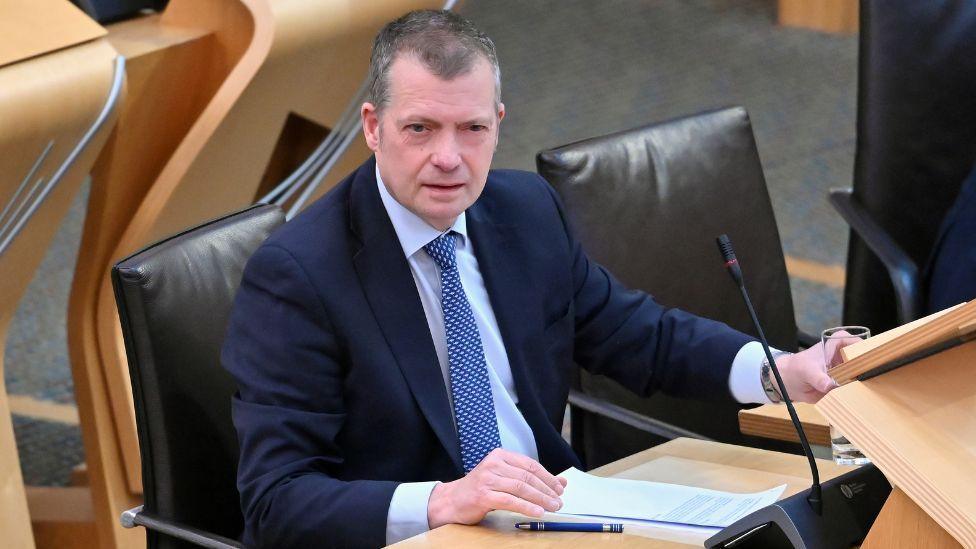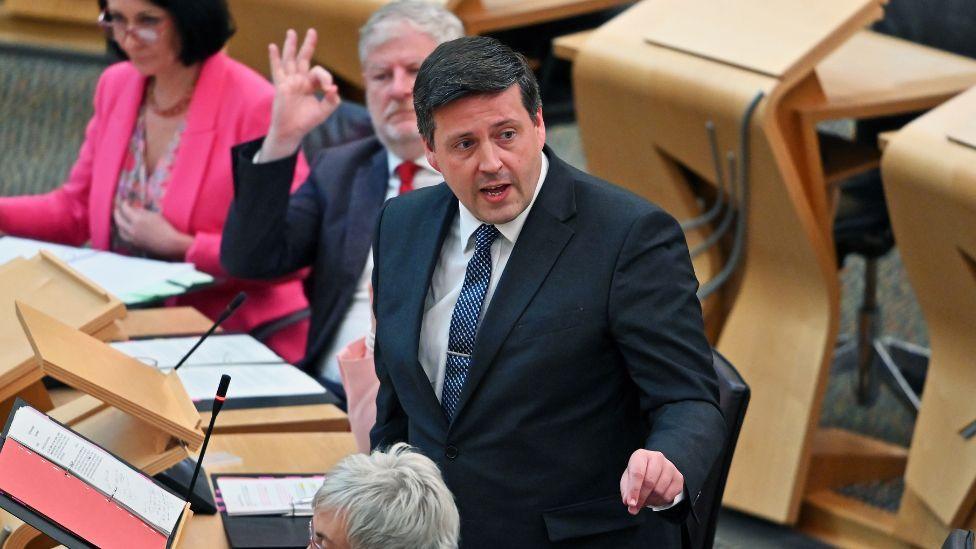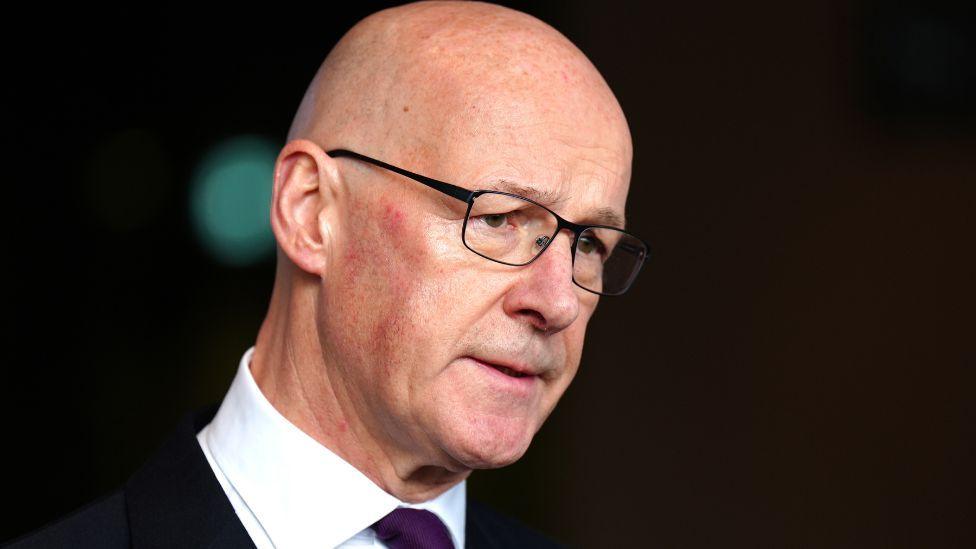Opposition MSPs back move to ban 'double jobbing'

Stephen Flynn faced criticism from colleagues after announcing his intention to hold seats at both the Scottish and UK parliaments
- Published
Opposition MSPs are calling for dual mandates to be banned after SNP Westminster leader Stephen Flynn launched a bid to hold seats at both Holyrood and Westminster.
Conservative MSP Graham Simpson will re-table an amendment to the Scottish Elections (Representation and Reform) Bill to outlaw so-called "double jobbing" in time for the 2026 election.
A vote could be held before Christmas, with both Labour and the Greens supporting the move.
The minority SNP government said it was in favour of considering a ban, but that a consultation should be held first.
Flynn faced criticism, including from within his party, after announcing that he intended to stand for the SNP in Aberdeen South and North Kincardine seat at the 2026 Holyrood election.
He said he also intended to remain at Westminster until the next general election, currently scheduled for 2029.

Conservative MSP Graham Simpson will re-table an amendment to the Scottish Elections Bill
Flynn and SNP colleagues previously criticised former Scottish Tory leader Douglas Ross for holding two seats at once.
The SNP Westminster leader said the reaction had not been "pleasant", but that he would not be "hounded out" from standing up for his beliefs.
Under Simpson's proposals, an MP who is elected to Holyrood would have to stand down from Westminster within eight days.
Writing in the Daily Record, external, he said holding a so-called dual mandate was wrong.
"The Scottish Parliament should be given the opportunity to end this nonsense ahead of 2026 and I will give it that chance," Simpson wrote.
"I will re-table my amendments on this so that parties can do the right thing and show that MSPs think the practice of double jobbing is no longer acceptable."
The Central Scotland MSP highlighted that dual mandates had already been banned in Wales and Northern Ireland.
He withdrew a previous amendment to ban the practice after Parliamentary Business Minister Jamie Hepburn said, external he supported considering a ban on dual mandates, but that he wanted to launch a consultation on the issue.

SNP minister Jamie Hepburn has committed to launching a consultation on a proposed ban
Hepburn said a ban, which could also apply to councillors and peers in the House of Lords, would not be in place by the 2026 election if a consultation takes place.
At the time, Simpson agreed that there “ought to be some consultation” and that it was right one was launched in this parliamentary session.
But writing in the Daily Record, he said Flynn's announcement had helped him decide to push for a ban before the next election.
It would be up to the Presiding Officer to decide whether the amendment is selected for debate and a vote at stage three of the bill's journey through parliament.
If selected, a vote is expected to be held before Christmas.
'Height of arrogance'
The SNP group have 62 MSPs, short of the 65 required for a majority.
Scottish Labour said they would back a ban on "double jobbing".
The party's business manager, Martin Whitfield, said: “Being an MP or an MSP is a full-time job and it is the height of arrogance to try and do both.
“Whether it’s Douglas Ross or Stephen Flynn, Tory and SNP politicians have been taking their constituents for granted for too long."
Green MSP Gillian Mackay also backed Simpson's proposal.
“This has gone on for too long. Other devolved parliaments have rules in place to stop it, and Holyrood should too," she said.
Scottish Liberal Democrat leader Alex Cole-Hamilton told the Herald, external he was not opposed to dual mandates in his party if the individual politician can "make them work".
It is understood the LibDems want to look at Simpson’s amendment in detail before making a decision on how to vote.
The amendment would be voted on as part of the stage three consideration of the elections bill.
Dozens of MSPs have had a dual mandate, either as a member of the House of Lords, the House of Commons or as a councillor - including 20 this term, external.
A government spokesperson noted that Hepburn had committed to carrying out "a full public consultation on the issue to seek the views of political parties, Cosla and importantly the public".

There's a way to go before a ban on dual mandates could be put to the vote - and on first glance, the numbers don't seem to stack up in Graham Simpson's favour.
But many of Stephen Flynn's SNP colleagues at Holyrood have been angered by his announcement. Would they feel strongly enough to break the party whip?
And what about Graham Simpson's own colleagues?
The Scottish Tories' former leader Douglas Ross held a dual mandate, so how would they feel about outlawing the practice entirely?
Then there is an issue to consider for all parties - it's not clear if Simpson's plan would still extend to councillors becoming MSPs, but if so, that could affect a very large number of potential Holyrood candidates.
Related topics
- Published13 November 2024

- Published17 November 2024
